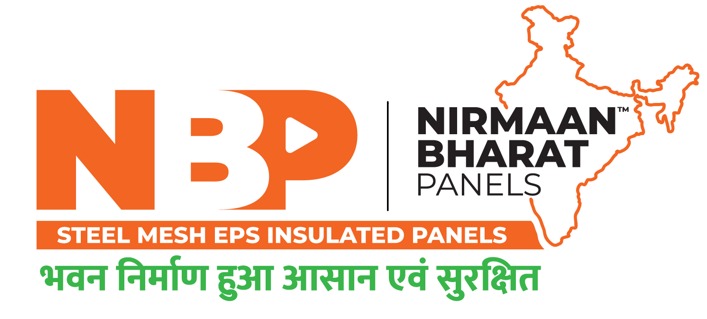In recent years, India has been experiencing rapid urbanisation and industrial growth, which has put immense pressure on its construction industry. Traditional building materials and methods often struggle to meet the growing demand for cost-effective, energy-efficient, and sustainable solutions. Enter Expanded Polystyrene (EPS) panels – a lightweight, durable, and versatile material that is making waves in Indian construction. EPS panels have gained popularity due to their thermal insulation properties, affordability, and adaptability. This blog delves into the various applications of EPS panels in India, showcasing their transformative potential in diverse sectors.
Table of Contents
ToggleWhat are EPS Panels?
Expanded Polystyrene (EPS) is a type of foam made from polystyrene beads that expand when exposed to heat. The resulting material is composed of 98% air, making it extremely lightweight yet structurally strong. EPS panels are sandwich panels that consist of two outer layers (usually made from steel or concrete) with an EPS core in the middle. This composition not only provides strength but also excellent insulation properties, making EPS panels ideal for various applications in construction and beyond.
Applications of EPS Panels in India
EPS panels (Expanded Polystyrene) are making a significant impact across various sectors in India due to their lightweight, durable, and energy-efficient nature. Whether in residential, commercial, industrial, or other specialized sectors, EPS panels offer versatile solutions that address the growing demand for sustainable and cost-effective construction. Below, we explore the diverse applications of EPS panels in these key areas.
1. Residential Applications
EPS panels are transforming the residential construction landscape in India, offering energy efficiency, rapid construction, and affordability. Their use in homes provides several advantages:
- Walls and Roofs: EPS panels are commonly used for both walls and roofs in residential buildings. Their thermal insulation helps regulate indoor temperatures, reducing the need for heating and cooling systems, which leads to energy savings.
- Affordable Housing: EPS panels are heavily utilized in government and private affordable housing projects due to their cost-effectiveness and ease of installation. Homes built with EPS panels are more environmentally friendly and sustainable, making them ideal for urban and rural housing projects.
- Prefab and Modular Homes: Prefabricated homes, which are growing in popularity in India, are often constructed using EPS panels. These homes are built off-site and assembled on-site, reducing construction time and labor costs.
- Renovations and Extensions: EPS panels are also being used in home renovation projects to extend spaces or improve insulation without the need for major structural changes.
2. Commercial Applications
The commercial sector, from office buildings to shopping malls, is increasingly adopting EPS panels due to their flexibility, durability, and thermal efficiency:
- Office Buildings: EPS panels are widely used in the construction of modern office spaces, particularly for partition walls, external cladding, and roofing. Their soundproofing properties make them ideal for open office environments where noise control is crucial.
- Shopping Malls and Retail Spaces: For large retail complexes and shopping malls, EPS panels offer cost-effective insulation, ensuring a comfortable shopping environment while keeping energy costs low. The panels’ lightweight nature also enables architects to create innovative designs without compromising structural integrity.
- Modular Offices: Temporary or modular office setups, commonly used in construction sites or startups, benefit from the easy assembly and disassembly of EPS panels. These structures can be relocated and reassembled quickly, making them an ideal solution for businesses needing flexible workspaces.
- Hotels and Hospitality: The hospitality industry is also turning to EPS panels for constructing eco-friendly hotels, resorts, and guesthouses. Their insulation properties ensure energy efficiency, and their lightweight nature enables quicker construction, allowing new establishments to open sooner.
3. Industrial Applications
The industrial sector has embraced EPS panels for a wide range of uses due to their excellent strength, thermal insulation, and moisture resistance:
- Factories and Warehouses: EPS panels are extensively used in building factories, warehouses, and storage facilities. Their insulating properties ensure that internal temperatures remain stable, reducing energy costs for climate-controlled environments.
- Cold Storage Units: EPS panels are the material of choice for constructing cold storage facilities in India’s booming agricultural and food processing sectors. Their excellent thermal insulation capabilities help maintain low temperatures, ensuring perishable goods remain fresh during storage.
- Pre-Engineered Buildings (PEBs): Pre-engineered industrial buildings, such as workshops, production facilities, and assembly plants, are increasingly being constructed with EPS panels. These panels offer fast assembly, structural strength, and thermal regulation, reducing both initial construction and long-term operating costs.
- Cleanrooms: In sectors like pharmaceuticals and electronics, cleanrooms require strict temperature control and air purity. EPS panels help maintain these controlled environments due to their insulation properties and ability to be easily customized to fit precise specifications.
4. Other Specialized Applications
EPS panels are also used in specialized sectors due to their versatility and unique properties:
- Educational Institutions: Schools, colleges, and universities are adopting EPS panels to construct classrooms, laboratories, and libraries. The sound insulation and energy efficiency of these panels ensure a comfortable and quiet learning environment.
- Healthcare Facilities: In hospitals, clinics, and healthcare centers, EPS panels are ideal for building hygienic, fire-resistant, and well-insulated spaces. Their smooth surface is easy to clean, making them a perfect fit for sterile environments like operating rooms and patient wards.
- Sound Barriers for Highways and Railways: EPS panels are being used to construct sound barriers along highways and railways to minimize noise pollution in urban areas. These panels are lightweight, easy to install, and resistant to weather, making them an effective long-term solution.
- Recreational and Sports Facilities: India’s growing emphasis on sports and fitness has led to the construction of recreational complexes, gyms, and indoor sports arenas. EPS panels are widely used in these structures for their durability, thermal regulation, and soundproofing properties, ensuring a comfortable and efficient environment for athletes and spectators.
- Portable Cabins and Emergency Shelters: EPS panels are often used in the construction of portable cabins for temporary housing, disaster relief shelters, and emergency response units. Their lightweight design and easy assembly make them a quick and reliable solution in times of crisis or for temporary housing needs.
Advantages of EPS Panels Across Sectors
Regardless of the sector, EPS panels offer several universal advantages that make them a preferred construction material:
- Thermal Insulation: EPS panels provide excellent thermal insulation, helping reduce energy consumption in both residential and commercial buildings.
- Soundproofing: In noisy environments, such as schools, offices, and along transportation corridors, EPS panels offer sound insulation, ensuring quieter interiors.
- Lightweight and Easy to Install: The lightweight nature of EPS panels makes them easy to transport and install, reducing labor costs and construction time.
- Durability and Strength: Despite their lightweight composition, EPS panels are highly durable and resistant to environmental factors such as moisture, heat, and cold.
- Cost-Effective: Due to their ease of installation, low transportation costs, and energy-saving capabilities, EPS panels are a cost-effective solution for a wide range of construction needs.
- Sustainability: EPS panels are recyclable and contribute to reducing the overall environmental impact of construction, making them an eco-friendly option.
The Future of EPS Panels in India
The applications of EPS panels in India are vast and continually expanding as the country looks for sustainable, energy-efficient, and cost-effective construction solutions. With the government’s push for affordable housing, smart cities, and infrastructural development, EPS panels are poised to play a critical role in shaping India’s future.
Moreover, as the construction industry becomes more aware of the environmental impact of traditional building materials, EPS panels offer an eco-friendly alternative that can significantly reduce construction waste and carbon emissions. Their recyclability and energy efficiency make them an excellent choice for developers and builders looking to reduce their ecological footprint.
Conclusion
EPS panels have emerged as a game-changer in India’s construction industry. Their versatility, cost-effectiveness, and sustainability make them an ideal choice for a wide range of applications, from affordable housing and cold storage to modular offices and sports complexes. As the country continues to grow and urbanize, EPS panels will undoubtedly play a pivotal role in meeting the demands of modern construction while promoting environmental sustainability.
FAQs
Q1: What are the benefits of using EPS panels in construction?
Ans: EPS panels offer several benefits, including excellent thermal insulation, soundproofing capabilities, and a lightweight design that simplifies transportation and installation. They are also cost-effective due to reduced labor and energy expenses. Additionally, EPS panels are durable and resistant to moisture, making them suitable for various environments.
Q2: How are EPS panels used in affordable housing projects?
Ans: EPS panels are widely utilized in affordable housing projects because of their cost-effectiveness and quick installation process. They can be used for walls and roofs, providing thermal insulation that helps maintain comfortable indoor temperatures. Their lightweight nature allows for easier handling, which is particularly beneficial in rural or underserved areas where resources may be limited.
Q3: Can EPS panels be customized for specialized applications?
Ans: Yes, EPS panels can be easily customized to meet specific needs for various applications, such as cleanrooms in the pharmaceutical industry or sound barriers along highways. Their versatility allows for tailored solutions that address unique requirements, ensuring compliance with strict building standards and performance criteria.


